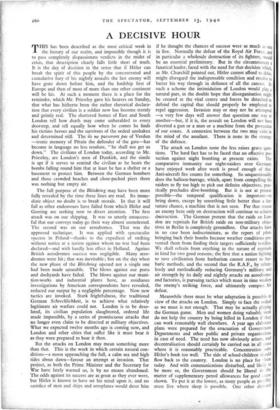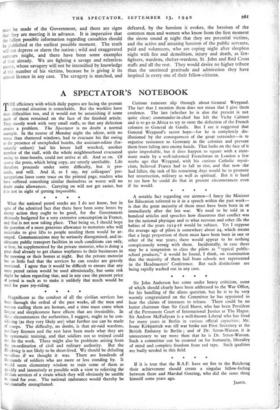A DECISIVE HOUR
THIS has been described as the most critical week in the history of our realm, and impossible though it is to pass completely dispassionate verdicts in the midst of crisis, that description clearly falls little short of truth. It is the day of decision in the sense that if Hitler can break the spirit of this people by the concentrated and cumulative fury of his nightly assaults the last enemy will have gone down before him, and the lordship first of Europe and then of most of more than one other continent will be his. At such a moment there is a place for the reminder, which Mr. Priestley gave his hearers on Sunday, that what has hitherto been the rather rhetorical declara- tion that every civilian is a soldier now has become sternly and grimly real. The shattered homes of East and South London tell how death may come unheralded to every doorstep, and tell equally how when he comes he finds his victims heroes and the survivors of the ordeal unshaken and determined still. The i/s ne passeront pas of Verdun —ironic memory of Pertain the defender of the gate—has become in language no less resolute, " he shall not get us down." The civilians of London today, according to Mr. Priestley, are London's men of Dunkirk, and the simile is apt if it serves to remind the civilian as he hears the bombs falling round him that at least he has a shelter or a basement to protect him. Between the German bombers and those crowded beaches and close-packed piers there was nothing but empty air.
The full purpose of the Blitzkrieg may have been more fully revealed by the time these lines are read. Its imme- diate object no doubt is to break morale. In that it will fail as other endeavours have failed from which Hitler and Goering are seeking now to divert attention. The first attack was on our shipping. It was so utterly unsuccess- ful that our convoys today go their way almost unmolested. The second was on our aerodromes. That was the approved technique. It was applied with spectacular success in Poland—thanks to the expedient of striking without notice at a nation against whom no war had been declared—and with hardly less effect in Holland. Against British aerodromes success was negligible. Many aero- dromes were hit; that was inevitable; but on the day when the new phase of the Blitzkrieg opened not a single one had been made unusable. The blows against our ports and dockyards have failed. The blows against our muni- tion-works and industrial plants have, as assiduous investigations by American correspondents have revealed, reduced our output by a negligible percentage. Now new tactics are invoked. Stark frightfulness, the traditional German Schrecklichkeit, is to achieve what relatively legitimate air warfare could not. London is to be deso- lated, its civilian population slaughtered, ordered life made impossible, by a series of promiscuous attacks that no longer even claim to be directed at military objectives. What we expected twelve months ago is coming now, and London and other cities that suffer like it must bear it as they were prepared to bear it then.
But the attacks on London may mean something more than that. This is the week in which certain natural con- ditions—a moon approaching the full, a calm sea and high tides about dawn—favour an attempt at invasion. That project, as both the Prime Minister and the Secretary for War have lately warned us, is by no means abandoned. The odds against its success are as great as they ever were, but Hitler is known to have set his mind upon it, and no sacrifice of men and ships and aeroplanes would deter him if he thought the chances of success were as much as one in five. Normally the defeat of the Royal Air Force, and in particular a wholesale destruction of its fighters, would be an essential preliminary. But in the circumstances a fanatical leader, faced with the need for that decision which, as Mr. Churchill pointed out, Hitler cannot afford to defer, might disregard the indispensable condition and resolve to batter his way through in defiance of all the canons. in such a scheme the intimidation of London would play a natural part, in the double hope that disorganisation might be created at the vital centre and forces be detached to defend the capital that should properly be employed to repel aggression. Invasion may or may not be attempted —a very few days will answer that question one way or another—but, if it is, the assault on London will not have diverted a gun or a man or a machine from the protection of our coasts. A connexion between the two may exist in the mind of the assailant. There is none in the strategy of the defence.
The attack on London none the less raises grave ques- tions. The hard fact has to be faced that no effective pro- tection against night bombing at present exists. The comparative immunity our night-raiders over Germany have enjoyed week after week is proof enough of that. Anti-aircraft fire counts for something. So unquestionably does the balloon-barrage, which, apart from compelling the raiders to fly too high to pick out definite objectives, prac- tically precludes dive-bombing. But it is not at present possible—the temporal qualification is important—to bring down, except by something little better than a for- tunate chance, a machine that is not seen. For that reason an enemy bent only on destruction will continue to achieve destruction. The German pretext that the raids on Lon- don are reprisals for British raids on non-military objec- tives in Berlin is completely groundless. Our attacks have in no case been indiscriminate, as the report of pilots bringing back their bombs because weather conditions pre- vented them from finding their targets sufficiently testifies. We shall refrain from anything in the nature of reprisals in kind for two good reasons; the first that a nation fighting to save civilisation from barbarism cannot resort to bar- baric methods, and the second that the R.A.F., by relent- lessly and methodically reducing Germany's military and air strength by its daily and nightly attacks on aerodromes and factories, is pursuing tactics which must in time weaken the enemy's striking force, and ultimately compass IDs defeat.
Meanwhile there must be what adaptation is possible in view of the attacks on London. Simply to face the ordeal as we must is not enough. That may be actually playing the German game. Men and women doing valuable work do not help the country by being killed in London if they can work reasonably well elsewhere. A year ago elaborate plans were prepared for the evacuation of Government Departments and other public and private organisations in-case of need. The need has now obviously arisen- and decentralisation should certainly be carried out in all ..ases where it is reasonably practicable. Concentration suits Hitler's book too well. The tide of school-children should flow back to the country. London is no place for ,!ieln today. And with communications disturbed, and likely' to be more so, the Government should be liberal in the matter of supplementary petrol allowances for good nice shown. To put it at the lowest, as many people as pc- '1'1" must live where sleep is possible. One other der :1-1 must be made of the Government, and there are signs that they are meeting it in advance. It is imperative that the fullest possible information regarding casualties should be published at the earliest possible moment. The truth will not depress or alarm the nation ; wild and exaggerated rumours might, and there have been some examples of that already. We are fighting a savage and relentless enemy, whose savagery will not be intensified by knowledge of the number of his victims, because he is giving it its utmost licence in any case. The savagery is matched, and defeated, by the heroism it evokes, the heroism of the common men and women who know from the first moment the sirens sound at night that they are potential victims, and the active and amazing heroism of the public servants, paid and volunteers, who are coping night after sleepless night with fire and demolition, injury and death, as fire- fighters, wardens, shelter-wardens, St. John and Red Cross staffs and all the rest. They would desire no higher tribute than the unstinted gratitude and admiration they have inspired in every one of their fellow-citizens.



























 Previous page
Previous page